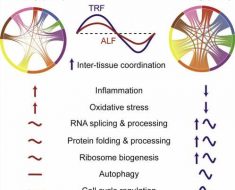Kate Garraway says Derek is an 'extreme example' of long Covid
We use your sign-up to provide content in ways you’ve consented to and to improve our understanding of you. This may include adverts from us and 3rd parties based on our understanding. You can unsubscribe at any time. More info
According to a survey conducted by the Office for National Statistics, long Covid is believed to have affected 11,000 children aged two to 11 and 23,000 children aged 12 to 16. The findings come after a separate report, published earlier this week, said that children were unlikely to suffer from the syndrome. There is no universally agreed definition of long Covid, but it covers a broad range of symptoms including muscle pain, brain fog and fatigue.
New research has identified the four symptoms that are most prevalent in COVID-19 positive children with lingering symptoms.
The study led by researchers at King’s College London, drew on data from 1,734 children from five to 17 years old, logged in the Zoe Covid Study app.
The analysis was based on data collected between September 2020 and February 2021, coinciding with the reopening of schools in the autumn, and the peak of the winter wave of the virus in the UK.
The study found that one in 20 children with COVID-19 with long Covid continue to be symptomatic beyond four weeks.
READ MORE: Statins may protect people with high blood pressure from dying from COVID-19 – new study

Of all the children studied who tested positive for COVID-19, 77 experienced symptoms for four weeks or more.
Researchers observed that 84 percent suffered fatigue, 78 percent suffered headaches, 78 percent experienced loss of smell and 74 percent had a sore throat.
The most prevalent symptoms among the 25 children who experienced symptoms up to eight weeks, were loss of smell (84 percent, headache (80 percent), sore throat (80 percent) and fatigue (76 percent).
The study, published in the journal The Lancet Child and Adolescent Health, also found that older children were more likely to have longer symptoms than those under the age of 12.
Professor Duncan said: “It will be reassuring for families to know that those children who do fall ill with COVID-19 are unlikely to suffer prolonged effects.
“However, our research confirms that a small number have longer illness durations with COVID-19, though these children too usually recover with time.”
Doctor Erika Molteni, first author of the study, from King’s College London, noted: “We found that nearly a quarter of symptomatic children testing positive for COVID-19 during the UK’s second wave did not report core symptoms, suggesting the UK testing policy needs reconsideration.”
Researchers also compared children who tested positive for COVID-19 with children with other illnesses, and found that children with Covid were more likely to be ill for longer than four weeks, but children with other illnesses were likely to experience more symptoms at the four-week mark.

Doctor Michael Absoud, senior author of the study, noted: “Our data highlighted that other illnesses, such as colds and flu, can also have prolonged symptoms in children.
“It is important to consider this when planning for paediatric health services during the pandemic and beyond.
“This will be particularly important given that the prevalence of these illnesses is likely to increase as physical distancing measure implemented prevent the spread of COVID-19 are relaxed.”
Given the time frame of the data, researchers noted the study did not show how the results translate for the Delta COVID-19 variant, which began dominating from May onwards.

Furthermore, the study didn’t investigate the risk of myocarditis, a condition characterised by heart inflammation, which US research suggested was elevated in COVID-19 patients aged between 12 and 17.
Doctor Absoud added that the results support the recent Joint Committee on Vaccination and Immunisation recommendation that children over 12 in the UK will get a vaccine only if they are clinically extremely vulnerable or live with somebody at risk.
For children aged between 12 and 15, vaccination is currently only recommended for those with underlying conditions or living with other at high risk.
Doctor June Raine, head of the Medicines and Healthcare Products Regulatory Agency, which has rules that the Pfizer jab is safe for those aged 12 to 15, said: “Our advice remains that the benefits of getting vaccines outweigh the risks for the majority of people.”
Source: Read Full Article





